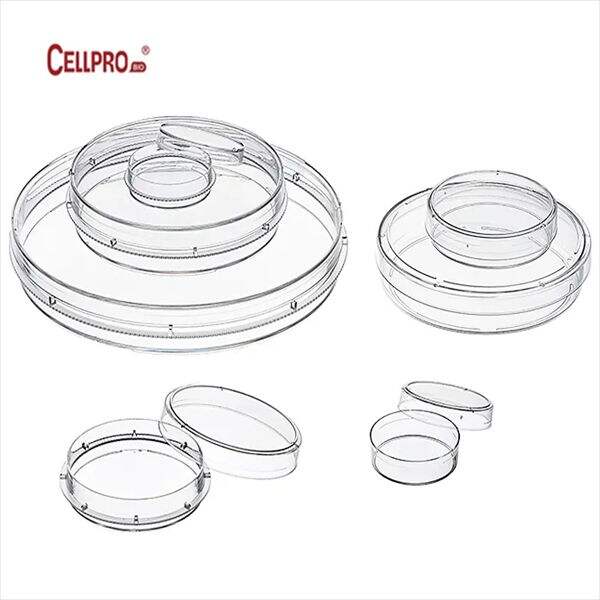Avez-vous déjà pris le temps de réfléchir à la manière dont les scientifiques en savent autant sur les cellules ? C'est assez intéressant ! La culture cellulaire en boîte de Petri est l'une des façons dont les scientifiques étudient les cellules. Nous allons non seulement découvrir ce qu'il y a dans une culture cellulaire en boîte de Petri, mais aussi comment la réaliser étape par étape, pourquoi la recherche scientifique dépend de ces informations afin que vous puissiez comprendre le monde qui nous entoure. Dans Shengke plaque de Petri pour culture cellulaire , les scientifiques cultivent de petites cellules vivantes qu'un scientifique souhaite étudier dans une assiette en plastique ronde. On l'appelle une plaque de Petri, ce plat spécial. Une goutte de milieu de culture est présente à l'intérieur de la plaque de Petri. Ce liquide est essentiel car il contient les bons éléments pour maintenir les cellules en vie et en bonne santé. Les cellules sont ensuite réparties dans un environnement qui ressemble autant que possible à leur habitat naturel, selon nos connaissances pour le créer. Cela peut reproduire les conditions présentes à l'intérieur du corps humain ou ailleurs, là où ces cellules vivent naturellement.
Dans l'ère moderne de la biologie, la culture cellulaire dans des plats de Petri joue un rôle très important. Cela aide à étudier les cellules de manière sécurisée et contrôlée. Ainsi, on peut manipuler les cellules et observer comment elles réagissent aux changements sans avoir à gérer tous les facteurs extérieurs qui entrent en jeu lors de l'étude des cellules à l'intérieur d'un être vivant. Observer les cellules se développer et fonctionner dans un plat de Petri est loin de ce qui se passe dans notre corps, combien de fois ai-je entendu un scientifique dire quelque chose comme ça. Les plats de Petri nous apprennent beaucoup sur le comportement des cellules, leur croissance et leur communication entre elles. Ensuite, le plat de Petri doit être nettoyé. Cela est crucial car il faut s'assurer qu'il n'y ait aucune bactérie ou germes pouvant menacer les cellules. Ce processus est connu sous le nom de stérilisation.

Enfin, vous devez placer le plat de Petri dans un endroit chaud appelé incubateur. Shengke plat de Petri cellulaire est l'assiette où le plat sera à une température et une humidité optimales, permettant une croissance saine et heureuse des cellules.

L'une des méthodes les plus précieuses dont disposent les scientifiques pour étudier tout ce qui va de la biologie cellulaire normale aux maladies complexes est de faire pousser des cellules dans un plat de Petri. Découvrez les effets de divers médicaments et traitements sur les cellules du corps. Par exemple, les chercheurs pourraient observer comment certains médicaments modifient la croissance et le comportement des cellules. C'est également une recherche sur le fonctionnement des cellules souches et leur transformation en d'autres types cellulaires, une voie de recherche extrêmement importante, étant donné qu'elle fournit d'immenses insights sur la formation fonctionnelle de nos corps. Dolly, la première brebis clonée, était le résultat d'une étude controversée qui a utilisé cette technique même pour cloner un mammifère adulte.

L'avenir de la culture cellulaire en boîte de Petri est limité uniquement par l'imagination. Dans les domaines de la médecine, de la biologie et bien d'autres, elle a permis aux scientifiques de faire un certain nombre de découvertes importantes. Ce Shengke cellules du plat de Petri leur permet d'en apprendre davantage sur les maladies, leur distribution et leur impact sur nos corps. Ils peuvent également élaborer de nouveaux médicaments pour guérir ces maladies. Les scientifiques ont même examiné si ce processus pouvait être utilisé pour régénérer des organes à des fins de transplantation. Et cela pourrait fournir une application de sauvegarde de vie pour la culture cellulaire en boîte de Petri dans le futur.
professionnel de laboratoire un labo, culture cellulaire laboratoire microbiologie boîte de Petri, conseils robotiques vérification laboratoire etc., qui effectuera des tests de performance bio en un seul endroit ainsi que des recherches intégrées et développement de consommables, réactifs, instruments.
L'importation de matières premières de haute qualité à l'aide d'équipements avancés garantit la stabilité des cultures cellulaires dans les plaques de Petri. CellPro propose plus de 100 lignes de production entièrement automatisées, et des machines d'injection importées des marques FANUC, ARBURG, ENGEL, TOYO et autres, pour assurer la capacité de production et la qualité.
les produits sont certifiés selon les normes ISO9001, ISO14001, ISO13485 de gestion de la qualité pour les cultures cellulaires en plaques de Petri, ainsi que les normes CE et FDA.
Le Centre de Recherche et Développement de Moulage à Haute Précision peut gérer toutes les étapes de conception des produits, y compris la conception et la fabrication des moules, le traitement précis, l'adaptation du processus de conception des moules, la vérification biologique et l'échelle des cultures cellulaires en plaques de Petri.